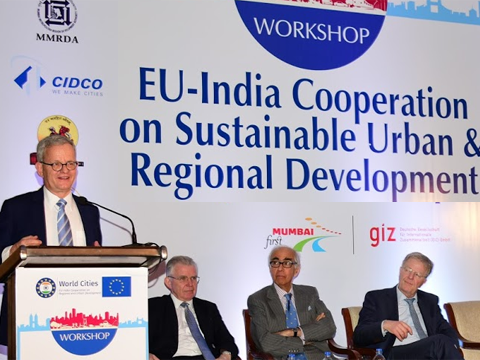On Saturday 23 January 2016, Director General for Regional and Urban Policy Walter Deffaa addressed the closing conference in Mumbai, India held under the EU's highly successful World Cities project. The project, which originates in a proposal of the European Parliament, provides for the pairing of city authorities and actors in Europe with their counterparts in, respectively, India, Canada, China and Japan. Participating in the Mumbai event were the Indian cities of Mumbai, Navi Mumbai, Ch
- 25 January 2016

On Saturday 23 January 2016, Director General for Regional and Urban Policy Walter Deffaa addressed the closing conference in Mumbai, India held under the EU's highly successful World Cities project. The project, which originates in a proposal of the European Parliament, provides for the pairing of city authorities and actors in Europe with their counterparts in, respectively, India, Canada, China and Japan. Participating in the Mumbai event were the Indian cities of Mumbai, Navi Mumbai, Chandigarh and Pune and their EU counterparts, respectively, Stuttgart (Germany), Lazio Region (Italy), Copenhagen (Denmark) and Andalucía Smart City (Spain). The project is implemented in India in partnership with the Mumbai First organization.
In his keynote address to the conference, Walter Deffaa said that developing the urban agenda was a priority for the EU. He added, "We have a two-pronged approach which, inside EU, uses the regulatory and investment means at our disposal as well as developing knowledge networks between our cities and, outside the EU, seeks to enrich and strengthen our urban policy capability through cooperation with major cities in other countries". He stressed the part which the private sector on each side can play in such cooperation, by helping to ensure that ideas are converted into projects on the ground, and the generation of new opportunities, in both India and the EU.
Mr. N. Nayar, Chairman, Mumbai First, expressed his deep appreciation for the excellent co-operation with EU cities and said that “We are committed to continue working with the European Union in new initiatives which will contribute to addressing Mumbai’s urban and environmental challenges”.
The conference was informed of the progress made under the different pairings between the EU and Indian cities respective: for Mumbai-Stuttgart, the exchanges covered the development of a climate change partnership, and discussed Mumbai Metropolitan Region's Environmental Database. Under the Navi Mumbai-Lazio relationship the cities have reviewed the economic, social and environmental dimensions of urban development policy, governance issues relating to urban planning, public participation, regulatory matters and urban transport solutions. For Copenhagen – Chandigarh, the focus was on ways to convert urban waste into a resource, non-motorized transportation and sewage treatment methods. Under the Pune- Andalucía Smart City pairing the focus was on the different dimensions of smart city policy in managing urban services and promoting quality of life for the urban population.
Mr Deffaa concluded his keynote speech by speaking of future prospects for EU-India cooperation. He said, "The method that we in the European Commission and our city partners have so successfully developed under our World Cities project is being followed from 2016 by a larger, more ambitious International Urban Cooperation Programme to bring together city and regional actors, including the private sector. It will include a specific component for EU-India exchange of experience and know-how".
The World Cities event in Mumbai joined forces with part of the annual "Stuttgart meets Mumbai" bilateral meeting, which, among other things, helped to raise awareness among a wider audience in Mumbai on World Cities cooperation between the EU and India.
